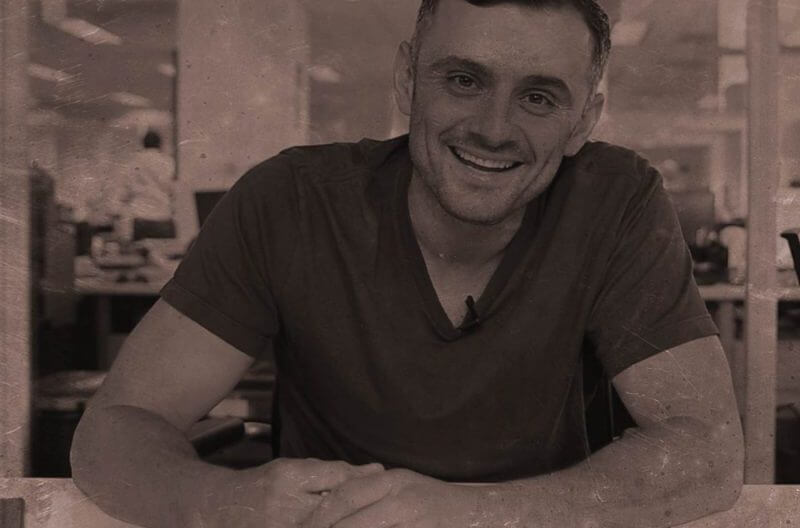Our From the Vault series examines episodes from The Art of Charm’s past more deeply; we invite you to revisit them — or discover them for the first time — with us. This From the Vault explores unapologetic workaholic Gary Vaynerchuk’s origin story and what makes him tick.
Episode 448: Climbing the Ladder with Gary Vaynerchuk was recorded in September 2015 and is part of AoC’s Best Of series. Jordan spent the episode exploring Gary Vaynerchuk’s past and present, and what drives his future.
Gary Breaks Down His Work Time Commitments
Gary spends 80% of his time involved with his 600-person social and digital firm VaynerMedia. It’s “like Mad Men, but in 2016.” Ten percent of his time is spent with Vayner/RSE, which is a 25 million dollar seed fund which got its start because of Gary’s successful early personal investments in Facebook, Twitter, and Tumblr. The final ten percent is spent in the AskGaryVee podcast and books/personal branding space.
How Gary Got to America
“I’m a straight capitalist-meritocratist, entirely driven by gratitude,” replies Gary in response to Jordan’s first questions about Gary’s emigration to the United States from Belarus. “I hate complainers because people don’t understand how good we have it [in the US]. Sure, there’s racism, greed, income inequality, but in America, it’s just so much better than the rest of the world.”
As Soviet Jews, Gary and his family were the beneficiaries of a trade policy condition regarding wheat that opened up visa approvals.
“It’s definitely worked out well for America in terms of tax dollars I pay in,” which is precisely the sort of opportunity-driven positivity that motivates Gary.
“The market isn’t perfect, but the opportunity [in America] is real.”
How Gary Responds to People Who Say: “You’re So Lucky!”
Gary’s father conveyed such a work ethic to Gary that there’s a true sense of discontent Gary feels when he hears about what people consider to be “hard work.” “If you’ve got time for entire seasons of Game of Thrones, please don’t tell me how hard you’re working.”
When Gary was first getting a lot of coverage, he received countless emails from high school friends who all, to a man or woman, used the term “lucky” in their correspondence. “You’re so lucky!” they exclaimed. Gary, being who he is, wrote every single one of them back explaining — sometimes diplomatically, sometimes less so (depending on how well he knew them) — that luck had nothing to do with what he’s accomplished. He would remind them that during senior year while others were out partying, he was out working every weekend. Calling Gary’s success “luck” is simply part of “living in a world convenient for your mindset.”
“Well, That’s Nice You Grew from $3M to $60M, but How about Starting from Zero?”
Gary admits that this accusation hits his emotional center, but that ultimately he took a step backwards by taking on the family business. In the mid-’90s he would have hustled and made his way regardless, but working in the family business gave him things money couldn’t buy: a chance to work with and be mentored by his father, and to have any bad tendencies “course corrected.” In fact, Gary confesses that when he was 18 and 19, he would call home and cry to his mom that he didn’t want to take on the business because he didn’t want people to say that his dad gave him a business. He wanted to make his own way, on his own steam.
Gary pointed out that, more than anything, people are in the excuse business. Why are people making this point? Is it because they’ve built something from zero? Or because they have to attack what I’ve done as a way to deflect from their own deficiencies?
How Gary Stays Hungry
It’s all about the climb and the journey for Gary. He was 4’11 during his freshman year of high school, and he was five years old when he started learning English and was teased mercilessly. As a result of these experiences, he hates the favorite and loves the underdog. In a certain way, winning shuts him off because he stops caring. He wants the challenge.
When he first started coming into his own in the digital media space he was called “Twitter Boy” by all the establishment agencies. They aren’t calling him that now. Ultimately, Gary wants to leave a legacy, and wants to bring along everyone around him for the ride, but he’s admittedly driven by personal vanity. He wants to be the best for other than altruistic reasons and doesn’t apologize for that.
Recognize Potential and Ignore Your Own Ego
Gary points out that sometimes parents aren’t asking the real questions in regards to their children’s performance in school. For example, his own mother would punish him for getting bad grades in school, because she wanted to teach him that there were consequences for bad behavior, but she would also help him schlep baseball cards through the snow to the car and off to shows where they would be sold, because she wanted to reward an area in which he was “winning.” Instead of reacting only in one way (“My kid is dumb!”), perhaps look at where your kid is winning and evaluate whether he/she needs to get good grades because you need them to, or whether he/she is meant to do something else and needs your encouragement in that area. If you want to be an anomaly, you need to act like one. It’s not a dirty word.
Remember, these From the Vault articles are meant to highlight just a few of the things discussed in a given episode and there’s lots more to hear, including Gary’s insightful take on the “should I go to college” question and what he thinks the biggest misconception about happiness is, so take a full listen to it here.
What are some of the best ideas you’ve taken from Gary? Send them to [email protected].
If this article or episode helped you, please consider writing a review for us on iTunes, because the greatest compliment you can give us is a referral to someone you think would appreciate this content. Now get out there and leave everyone better than you found them.



